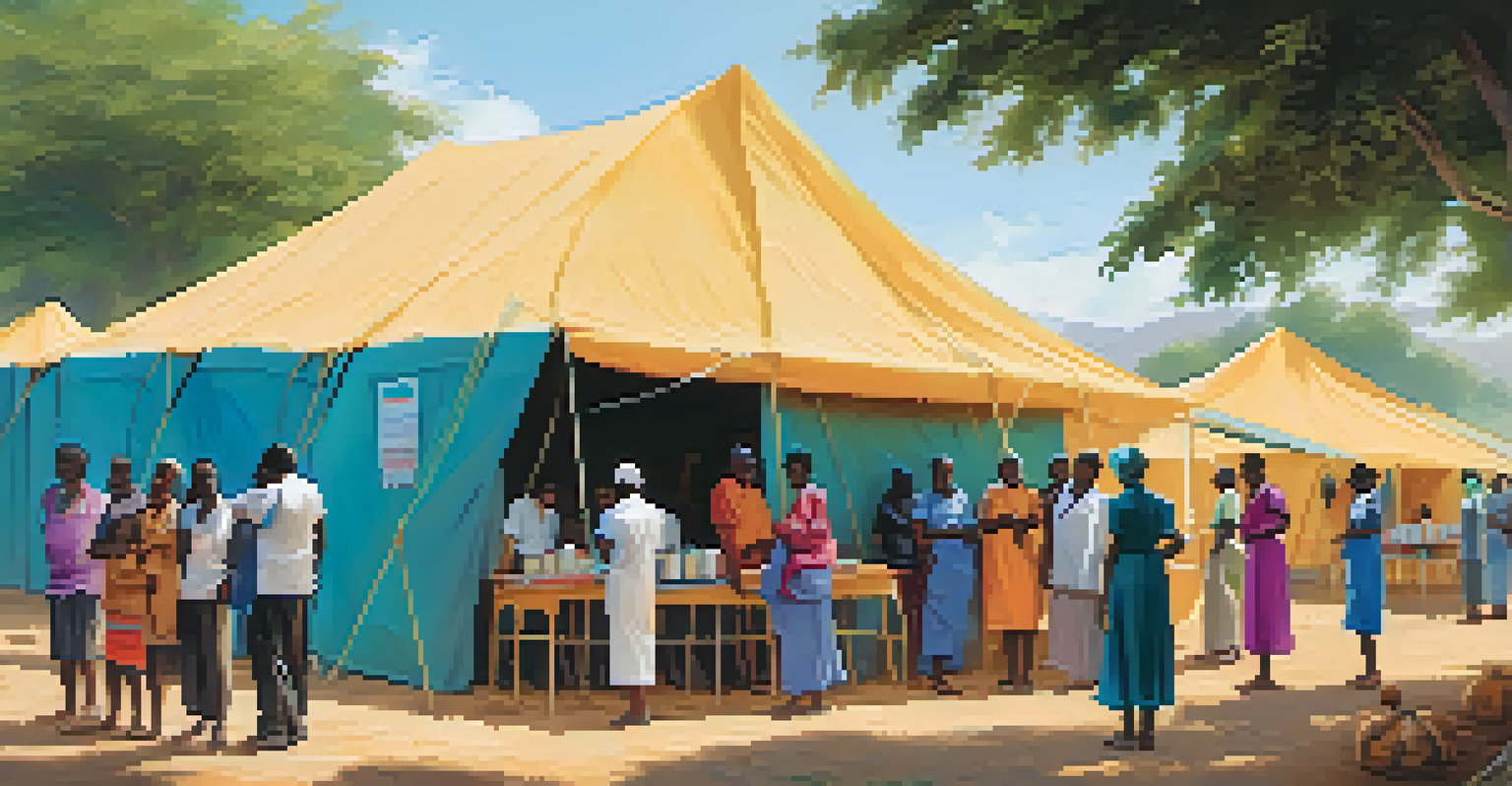Vaccination and Global Health Partnerships: A Collaborative Approach

The Importance of Vaccination in Global Health
Vaccination plays a crucial role in safeguarding public health worldwide. By immunizing populations against preventable diseases, we can significantly reduce morbidity and mortality rates. The impact of vaccines can be seen in the near eradication of diseases like smallpox and polio, showcasing their effectiveness.
Vaccines are the tugboats of preventive health.
Moreover, vaccines not only protect individuals but also contribute to herd immunity, which helps shield those who cannot be vaccinated, such as infants or individuals with certain health conditions. This interconnectedness highlights the importance of widespread vaccination efforts across communities and countries.
In essence, vaccines are a key tool in promoting global health equity. Ensuring access to vaccines for all populations can help bridge the health disparities that exist between affluent and underserved regions, paving the way for healthier futures.
Global Health Partnerships: A Unified Approach
Global health partnerships bring together various stakeholders, including governments, NGOs, and the private sector, to tackle health challenges collaboratively. These alliances allow for pooled resources, knowledge sharing, and coordinated efforts, enhancing the overall effectiveness of vaccination campaigns.

For instance, organizations like Gavi, the Vaccine Alliance, work with countries to ensure equitable access to vaccines, particularly in low-income areas. Such partnerships not only improve vaccine distribution but also strengthen the health systems of participating nations.
Vaccines Save Lives Globally
Vaccination significantly reduces disease rates and protects vulnerable populations through herd immunity.
Through collaboration, these partnerships can adapt to local needs, ensuring that vaccination strategies are culturally and contextually appropriate. This tailored approach makes it more likely that communities will embrace vaccination efforts and contribute to their success.
Challenges in Vaccination Efforts
Despite the progress made, vaccination efforts face several challenges. Misinformation about vaccines can lead to hesitancy, preventing communities from participating in immunization programs. Addressing these misconceptions is vital to encourage widespread acceptance.
The best way to protect your community is to get vaccinated yourself.
Additionally, logistical issues such as supply chain disruptions and inadequate healthcare infrastructure can hinder vaccine delivery, especially in remote or underserved areas. Ensuring that vaccines reach those who need them most requires innovative solutions and robust planning.
Furthermore, political instability in some regions can complicate vaccination efforts, making it difficult to implement and sustain programs. Overcoming these challenges necessitates strong collaboration among global health partners to create resilient systems that can withstand such adversities.
The Role of Technology in Vaccine Distribution
Technology plays a transformative role in enhancing vaccination efforts worldwide. Through digital platforms, health organizations can track vaccination data, manage supplies, and monitor outbreak trends in real time. This data-driven approach leads to more informed decision-making.
Mobile health applications, for example, allow families to receive reminders for vaccinations, ensuring that children are immunized on schedule. Such innovations bridge gaps in communication and encourage community engagement in health initiatives.
Collaboration Enhances Health Efforts
Global health partnerships unite diverse stakeholders to improve vaccine distribution and adapt strategies to local needs.
Moreover, telemedicine can facilitate consultations regarding vaccine-related concerns, providing families with access to credible information. By leveraging technology, global health partnerships can streamline processes and improve overall vaccination coverage.
Community Engagement: A Key to Success
Community engagement is essential for the success of vaccination programs. When local leaders and community members are involved in the planning and execution of immunization initiatives, there is a greater chance of acceptance and participation. Trust plays a significant role in these efforts.
By educating communities about the benefits of vaccines and addressing their concerns, health organizations can foster a supportive environment. Workshops, informational sessions, and collaborations with local influencers can help demystify vaccines and combat misinformation.
Additionally, empowering communities to take ownership of health initiatives can lead to sustainable changes. When people feel invested in their health outcomes, they are more likely to advocate for and participate in vaccination efforts.
Successful Case Studies of Collaborative Vaccination
Looking at successful case studies can provide valuable insights into effective vaccination strategies. For instance, the widespread immunization campaigns in countries like Rwanda have been driven by strong partnerships among the government, NGOs, and international organizations. This collaboration has significantly increased vaccination rates.
Another example is the Global Polio Eradication Initiative, which has united various stakeholders to reduce polio cases by over 99%. By sharing resources and expertise, these partnerships have shown that collective action can lead to remarkable achievements in public health.
Community Engagement Drives Success
Involving local leaders and educating communities fosters trust and increases participation in vaccination programs.
These success stories highlight the importance of collaboration in overcoming challenges and improving health outcomes. Learning from these examples can inspire other nations to adopt similar approaches, ultimately benefiting global health.
Looking Ahead: The Future of Vaccination and Partnerships
As we look to the future, the importance of vaccination and global health partnerships will only grow. With emerging infectious diseases and changing health landscapes, a collaborative approach will be crucial in tackling these challenges head-on. Continued investment in partnerships is necessary to ensure that all populations have access to life-saving vaccines.
Furthermore, fostering innovation in vaccine development and distribution will be essential in addressing the evolving needs of global health. By harnessing advancements in science and technology, we can enhance our response to health crises.

Ultimately, a united front in vaccination efforts can pave the way for a healthier, more resilient world. By working together, we can ensure that everyone, everywhere, has the opportunity to benefit from vaccines, contributing to a brighter future for all.